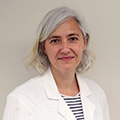 Dr Ibane Abasolo
Dr Ibane Abasolo
Dr Ibane Abasolo, obtained the degrees in Biochemistry and Biology from the University of Navarra (Spain) in 1997 and 1998, respectively. During her post-doctoral training at IMIM and IAT-PRBB in Barcelona, she gained extensive experience in experimental mouse models and molecular imaging techniques. In 2007, Dr Abasolo joined the Vall d’Hebron Research Institute (VHIR), where she established the Functional Validation & Preclinical Research (FVPR) area, a ISO9001:2015 certified technological platform, part of the Spanish Singular Technical Scientific Infrastructure (ICTS) Nanbiosis. Since March 2021 Dr Abasolo is also the leader or the Drug Delivery & Targeting (DDT) group at VHIR and at the Spanish Network in Bioengineering, Biomaterials and Nanomedicine (CIBER-BBN).
Research interests of Dr Abasolo include the development of improved treatments for cancer and lysosomal storage disorders (LSDs), through the use of new nanotechnology platforms and state of the art in vitro and in vivo models. Over the last 15 years, Dr Abasolo has contributed to the preclinical development of more than 30 therapeutic nanosystems in the fields of oncology and systemic diseases, while keeping basic research lines in their pathophysiology. Currently, she is leading 3 European projects (EvoNano, SafeNMT y Mimic-Key) and 3 national projects (1 FIS -P21/0936-, 1 RETOS-Colaboración, 1 transference project). Research career of Dr Abasolo is supported by her publications in the field of cancer and lysosomal storage diseases (>1700 citations, h-25, 20% publications in D1) and a reliable network of national and international collaborators. She is also co-inventor in 4 different patents, one of them licensed to a pharmaceutical company.
 Dr Mary Cano
Dr Mary Cano
Dr Mary Cano is a Chemical Engineer from University of Murcia. Dr Cano received her PhD (Cum Laude) in Material Sciences from the UAB in 2009. Since mid-2010, Dr Cano has coordinated the Division of Delivery systems of the Supramolecular NanoChemistry & Materials (NanoUP) research group at ICN2. Her efforts are focused on the design and optimization of delivery systems to treat a series of diseases in close collaboration with colleagues at research hospitals. Moreover, she is also co-founder of the spinoff Ahead Therapeutics S.L
 Dr Gabriel Capellà
Dr Gabriel Capellà
Gabriel Capellá obtained his MD degree by the University of Barcelona in 1983. He trained as a general and digestive surgeon. His interest in translational cancer research lead him to a postdoctoral stay with Dr Manuel Perucho the years 1989 and 1990 at La Jolla, USA. Back to Spain he spent 8 years at the Gastrointestinal Research Laboratory at the Hospital de Sant Pau where he focused his research in the molecular basis of pancreatic and colorectal cancer. He was Director of the Translational Research Laboratory of the Catalan Institute until 2011 where he is now Director of the Hereditary Cancer Program. He has pioneered the implementation of cancer genetics units and molecular testing of hereditary cancer in Spain. His research projects are centered in the detection and clinical and molecular characterization of Lynch Syndrome and Familial Adenomatous Polyposis, also in the development of novel technologies for genetic analysis. He is coauthor of more than 400 publications in international peer-reviewed journals and has co-founded a spinoff VCN Biosciences aimed at the development of oncolytic virus-based therapies. He has served as vice-director of Investigation and Innovation of the Catalonian Health Department. Currently he is Director of the Biomedical Research Institute IDIBELL.
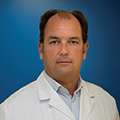 Dr Ricard Ferrer
Dr Ricard Ferrer
Dr Ricard Ferrer is Head of the Intensive Care Department at Vall d’Hebron Hospital in Barcelona, Spain. He graduated in 1992 from the University of Barcelona, Medical School and pursued his specialisation in Intensive Care from 1994 to 1998 and his PhD title in 2010 from the Universitat Autonoma de Barcelona.
Dr Ferrer is the Head of the SODIR research group at Vall d’Hebron Institute of research and collaborates is several research networks: CIBERES, EDUSEPSIS and EGIS. He has published a number of original articles and review articles in peer reviewed journal in the field of sepsis and severe infections and has contributed to the publication of book chapters on those topics (H-index Google Scholar 2022= 50).
Regarding teaching activities, Dr Ferrer is associated Professor at Universitat de Barcelona and Co-director of Severe Infections and sepsis Masterclass at ESICM.
Prof. Ferrer holds several positions at a numerous intensive care societies: He is past-president of the Spanish Society of Intensive Care (SEMICYUC), Treasurer of European Society of Intensive Care (ESICM), member of the Council of the World Federation of Intensive Care Societies (WFICC) and Patron of the Foundation Codigo Sepsis.
 Dr Julia Garcia Prado
Dr Julia Garcia Prado
Dr Julia G Prado holds a Bachelor's Degree in Biochemistry and a Ph.D. in Immunology with Honors from the Autonomous University of Barcelona. In 2006, she was awarded the prestigious Marie Sklodowska-Curie Fellowship to conduct her postdoctoral at the University of Oxford. In 2009, Dr Prado returned to Spain and was awarded a highly competitive Miguel Servet Fellowship from the ISCIII, and in 2013 became group leader of Virievac. Prado's laboratory research interests focused on delineating the mechanism of "T cell immune exhaustion" as a significant barrier to HIV-1 cure and is actively involved in developing novel immunotherapies. Moreover, Dr Prado has transferred her knowledge in antiviral immunity to understand protective T-cell responses against SARS-CoV-2 infection. Dr Prado's group has been continuously supported by competitive public calls and private contracts, building a solid network of R&D alliances and scientific collaborations. Dr Prado has filed three patents, published 57 articles in Q1 and D1 international journals, accumulating an H-index of 26, and trained Ph.D., master, and graduate students from various national and international universities. In 2019, she joined the IGTP as Scientific Director, a position that combines with her role as a group leader at IrsiCaixa, an affiliated institute to the IGTP. She is an active member of the GESIDA-SEIMC group, the CIBERINFEC, and a member of the scientific advisory board of EATRIS-Spain at the ISCIII.
 Prof. Jose Antonio Garrido
Prof. Jose Antonio Garrido
Jose A. Garrido is an ICREA Research Professor and leader of the ICN2 Advanced Electronic Materials and Devices Group, which explores novel electronic materials, such as graphene and other 2D materials, and their potential in electronic and bioelectronic applications.
He received his Master’s and PhD degrees in Telecommunication Engineering from the Universidad Politécnica de Madrid in 1996 and 2000, respectively. From 2001 to 2004 he worked as a postdoc at the Walter Schottky Institute, Technische Universität München (Germany). He obtained his habilitation in experimental physics at this university in 2010 and from 2011 to 2015 held a lecturer (privatdozent) position at its department of physics. In 2015 Jose A. Garrido joined the ICN2 where, in addition to his role as Group Leader, he is Vice-Director and has been Head of the Strategy Development Office.
Jose A. Garrido has been co-leader of the Graphene Flagship biomedical technology work package, coordinating 14 teams from different countries to develop a new generation of neural interfaces based on graphene technologies. In addition, he is the coordinator of the European project BrainCom, in which 10 institutions from 6 countries participate in the development of a brain implant that allows verbal communication in patients with aphasia. He is also the coordinator of the i-VISION project funded by La Caixa Foundation, where 5 institutions join forces in the development of a retinal implant.
Jose A. Garrido is also founder of the ICN2 spin-off INBRAIN Neuroelectronics, funded in December 2019, where he is currently Chief Scientific Officer. The spin-off recently closed a Series A of 14,3 M€
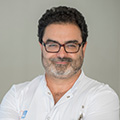 Dr Juan Pablo Horcajada
Dr Juan Pablo Horcajada
Head of the Department of Infectious Diseases, and Infection Control Coordinator at Hospital del Mar, Barcelona, Spain. His field of research is about optimizing the use of antibiotics, and applying PK/PD data for the treatment of complex and difficult to treat infections, including healthcare associated, and infections due to multidrug resistant microorganisms, specially extremely resistant Pseudomonas aeruginosa. Coordinator of the Infectious Pathology and Antimicrobials Research Group (IPAR) at the Institut Hospital del Mar d'Investigations Mèdiques (IMIM) of Barcelona, Spain. He has published more than 280 scientific articles and has directed several competitive research projects as a principal investigator, and several doctoral thesis. He participates as Principal Investigator in several international clinical trials with antimicrobials. Professor of the Department of Medicine at Pompeu Fabra University of Barcelona. Catalan Coordinator of regional Antimicrobial Stewardship Programs (PROA VINCAT). President of the Catalan Society of Infectious Diseases and Clinical Microbiology (SCMIMC). Spanish representative of the Infectious Diseases Specialty at the European Union of Medical Specialists (UEMS), Spanish Delegate of the European Committee for Infection Control (EUCIC) of the European Society of Clinical Microbiology and Infectious Diseases (ESCMID). Member of the Scientific Advisory Group (SAG) in Infectious Diseases of the European Medical Agency (EMA).
 Prof. Kostas Kostarelos
Prof. Kostas Kostarelos
Prof. Kostas Kostarelos read Chemistry at the University of Leeds and obtained his Diploma in Chemical Engineering and his PhD from the Department of Chemical Engineering at Imperial College London, studying the steric stabilization of liposomes using block copolymer molecules.
He carried out his postdoctoral training in various medical institutions in the USA (UCSF, Memorial Sloan-Kettering Cancer Center, Cornell). Following his promotion to Assistant Professor of Genetic Medicine and Chemical Engineering in Medicine at Cornell University Weill Medical College, he relocated to the UK as the Deputy Director of Imperial College Genetic Therapies Centre in 2002. In 2007 Kostarelos was awarded the first personal Chair of Nanomedicine in the UK and was Head of the Centre for Drug Delivery at the UCL School of Pharmacy in London.
The whole Nanomedicine Lab was recruited by the University of Manchester in 2013, while Prof. Kostarelos also maintained an Honorary Professorship with University College London.
Currently, Kostarelos is Professor and Chair of Nanomedicine at the Faculty of Biology, Medicine and Health, leads the Nanomedicine Lab and is a member of the National Graphene Institute and the Manchester Cancer Research Centre, all at the University of Manchester. He has been invited to Fellowships with the Royal Society of Chemistry, Royal Society of Medicine and Royal Society of Arts, all in the UK. He was awarded the Japanese Society for the Promotion of Science (JSPS) Professorial Fellowship in 2010.
In 2019 he joined the ICN2 as Severo Ochoa Distinguished Professor and Group Leader, while retaining his appointments and research team at the University of Manchester.
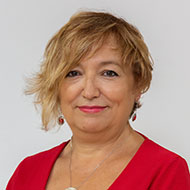 Prof. Laura Lechuga Gómez
Prof. Laura Lechuga Gómez
Prof. Laura M. Lechuga received her PhD in Chemistry from the Universidad Complutense de Madrid (Spain) in 1992. She is Full Professor of the Spanish National Research Council (CSIC) and Head of the Nanobiosensors and Bioanalytical Applications Group at the Catalan Institute of Nanoscience and Nanotechnology (ICN2) in Barcelona (Spain) and at the Networking Biomedical Research Center (CIBER-BBN). She has been Adjunct Professor at The Artic University of Norway (2012-2016) and Distinguished Visiting Professor at University of Campinas (Brazil) (2013-2017).
The principal focus of her research is the development of novel nanobiosensor devices based on nanoplasmonics and silicon-based photonics principles, including surface biofunctionalization, microfluidics for automatic fluid delivery and complete lab-on-a-chip integration for point-of-care devices. The use of nanobiosensor devices for a wide range of challenging clinical and environmental applications is one of her main objectives.
She has published over 260 articles, book chapters and proceedings, has 8 families of patents, and has presented her work worldwide in more than 360 invited talks. She has co-founded two spin-off companies. Prof. Lechuga is Associate Editor of Analyst (RSC) and has been Associate Editor for other two physics and engineering journals. She is a member of the Scientific Advisory Board of several national and international high-level research centres and has taken part in numerous international evaluation panels.
 Prof. M. Pilar Marco
Prof. M. Pilar Marco
Prof. M.-Pilar Marco Professor of Research of CSIC, Coordinator of the Nanomedicine Research Program of the CIBER-BBN, Coordinator of the Diagnostic Strategic Initiative of the PTI Salud Global and Head of the Nanobiotechnology for Diagnostics (Nb4D) group. She is a worldwide reference in the field of antibody-based technologies. As Head of the Nb4D group she leads and coordinates a multidisciplinary research team which scientific activity is addressed to develop a new generation of diagnostic approaches based on the integration of tailored bioreceptors with micro(nano)structures and/or innovative optical or electrochemical transducer schemes. Most of her research is performed in the context of international collaborations with different research institutions, companies and other stakeholders. She has co-authored more than 225 articles in international scientific journals of high-impact factor and has placed several patents, some of them under exploitation. She is also the Scientific Director of the Custom Antibody Service (CAbS) a facility of the ICTS NANBIOSIS that aims to provide support and services to research groups and companies in all aspects related to antibody production and use on different application fields.
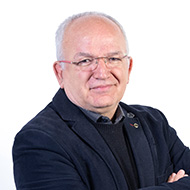 Prof. Arben Merkoçi
Prof. Arben Merkoçi
ICREA Research Professor and leader of the ICN2 Nanobioelectronics and Biosensors Group, Arben Merkoçi obtained his PhD at the University of Tirana (Albania) in ion selective electrodes. Since 1992 he has carried out research as postdoctoral fellow and research professor at the Polytechnic University of Budapest (Hungary), University of Ioannina (Greece), Università degli Studi di Padova (Italy), Universitat Politècnica de Catalunya, Universitat Autònoma de Barcelona and New Mexico State University (USA). His research is focused on the integration of biological molecules and other species with micro- and nanostructures of interest in the design of novel (bio)sensors.
Prof. Merkoçi is Co-Editor in Chief of Biosensors and Bioelectronics, the principal international journal devoted to research, design development and application of biosensors and bioelectronics, member of editorial board of Electroanalysis, Microchimica Acta and other journals.
Prof. Merkoçi has published 319 articles (H-index / citations: Google Scholar 84 / 23977; WOS 70 / 17682) and supervised 35 PhD theses. He is also involved in teaching PhD courses in the field of nanomaterial-based biosensors in several Spanish and international centres.
 Prof. Víctor Puntes
Prof. Víctor Puntes
ICREA Research Prof. Víctor F. Puntes’ work spans the full breadth of research on nanoparticles: synthesis, conjugation and characterisation of inorganic nanoparticles; study of their physicochemical properties; nanotoxicology and nanosafety; and a wide range of applications in different fields, including energy harvesting, catalysis, medicine and environment.
Prof. Puntes completed his undergraduate studies in chemical engineering and materials science at the Université Louis Pasteur Strasbourg (France) and the Universitat Autonoma de Barcelona (UAB). In 1998, he earned his PhD in physics from the Universitat de Barcelona (UB), working with Prof. Xavier Batlle and Prof. Amilcar Labarta on giant magnetoresistance in granular alloys. He then spent over three years at the University of California, Berkeley (USA) and the Lawrence Berkeley National Laboratory (LBNL, USA) in the groups led by Prof. Paul Alivisatos and Prof. Kannan Krishnan, working on the synthesis and control of nanostructures. In 2003 he returned to Catalonia with a Ramon y Cajal research grant at the UB. In 2005 he obtained an ICREA professorship at the then ICN (now ICN2) to create the Inorganic Nanoparticles Group, which he currently leads.
By the end of 2020, Víctor Puntes had 260 peer-reviewed publications and over 20,000 citations. He is also well-known for his work in science communication to the general public, his industrial and commercial efforts, and his endeavours linking science and art.
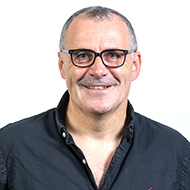 Prof. Daniel Ruiz-Molina
Prof. Daniel Ruiz-Molina
Daniel Ruiz-Molina got his PhD in Chemistry with a thesis on polyradical dendrimers at the Institut de Ciència de Materials de Barcelona (ICMAB-CSIC) under Prof. Jaume Veciana’s tutorship. Then he obtained a postdoctoral position at the University of California San Diego (USA), where he spent three years working on single molecule magnets and molecular switches.
Since 2001 he has held a permanent position as a Spanish National Research Council researcher, most recently at the ICN2, where he is the leader of the Nanostructured Functional Materials Group. His main research areas include the fabrication of hybrid colloids and surfaces, biomimetic functional nanostructures, and micro- or nanoparticles for smart applications and encapsulation and delivery systems.
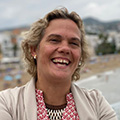 Dr Meritxell Teixidó
Dr Meritxell Teixidó
After dedicating more than 15 years to biomedical research at IRB Barcelona, trying to improve the arrival of drugs to the brain by crossing the blood-brain barrier that protects it. She decided to jump more barriers and be the CEO/CSO of Gate2Brain SL. in order to bring technology closer to patients, a challenge and an honor. Jumping barriers is perhaps the common thread that describes her, combining science and innovation with a new vision on disability, to believe that the impossible only comes later.


